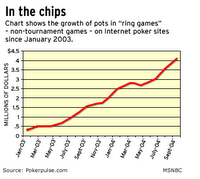The Death of Infinium Labs
 -$5 million funding deal cancelled
-$5 million funding deal cancelled-Founder charged with securities fraud by the SEC
-Authorized shares for sale nearing zero
The coffin is being lowered into the grave. After burning through over $60 million in 2 years with nothing to show for it, the Infinium Labs soap opera finally has come to an end.
Last week, Infinium Labs founder Timothy Roberts was officially charged with securities fraud by the SEC for an illegal fax scam back in Dec 2004. Roberts, while the CEO of Infinium Labs, hired stock promoter Michael Pickens to send mass “pump-n-dump” faxes. As the stock soared over 500% in a matter of days, Roberts dumped his holdings while profiting over $400,000.
But that wasn’t the bad news.
Yesterday, Infinium Labs withdrew their Form SB-2 registration statement. The SB-2 is an optional form for the registration of securities to be sold to the public by small business issuers. In order to initiate their $5 million funding deal from Golden Gate investors, the SB-2 needs to be approved by the SEC. But by withdrawing, the funding deal is cancelled.
Infinium Labs needed these funds to launch their new Lapboard product.
How did this Vaporware company even last this long? Simple. They had hundreds of millions of shares authorized to sell to the public. In other words, even though Infinium Labs has not made one penny in revenue in their 2 years as a public company, they were able to survive by selling more shares on the market (to the detriment of the shareholders, of course). All bills, salaries and R&D expenses were funded solely from stock sales.
But this pool of potential funds has finally dried up. They have issued over 540 million shares, but have less than 50 million left. With the stock trading at a penny, that equates to only $500,000 in available cash. With $13 million in liabilities & CEO Greg Koler’s salary of $250,000, the end is near.


